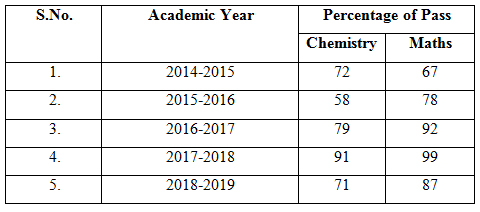
- Email info@sacollegeforwomen.in
- Telephone+91 (0)4565-283273

The Department of Physics was established in this college since its inception i.e. in the year 1962, to cater students who study Physics as an ancillary paper. The Department has well-equipped teaching laboratories including modern experimental setups for achieving high standards in learning. The main objective of the Department is to help the students of Physical Sciences and Mathematics to understands the role of Physics in Science and its applications in the day today Social life. By emphasizing the role of physics in life and other discipline, this department strengthens the students’ knowledge of physics.
Vision
The Department of Physics aims to provide Quality Education, develop inquiring minds and curiosity about science and the natural world, to impart knowledge, conceptual understanding and skills to solve problems and to make informed decisions in scientific and other contexts. It also aims to facilitate learning of science by providing, the knowledge about Nature and Natural Phenomena. It is also aimed to develop skills of scientific inquiry to design and carry out scientific investigations, communicate scientific ideas, arguments and practical experiences in a variety of ways for the fulfillment of individual and social needs and to take up responsibilities especially to uplift the weaker sections of the society.
Mission
The Department aspires to provide the best learning of Basic Principles of Physics, both Theoretical and Experimental, and dedicates most of its time to promote Quality Education, Scientific Research and Community Service, and marching towards establishing as a full-fledged department with Under Graduate and Post Graduate Courses in Physics.
Former Faculty of this Department
| S.No. | Name | Designation | Period Of Service |
|---|---|---|---|
| 1. | Dr. S.Saraswathi | Professor | 1972-2008 |
| 2. | Dr.S.Premalatha | Professor | 1975-2011 |


The Department has well-equipped laboratory and updated Teaching Technological arrangements. Equipments are available to have hands on training. Along with spacious laboratory our department has special arrangements to provide for Virtual Laboratory Learning to the students to ensure quality learning.
| S.No. | Equipment | Purpose |
|---|---|---|
| 1. | Carey Foster Bridge | To measure medium resistances, or to measure small differences between two large resistances. |
| 2. | Metre Bridge | To find the unknown Resistance of the Material. |
| 3. | Post Office Box | To measure an unknown resistance. |
| 4. | Torsion Apparatus | To measure the rigidity modulus of the object |
| 5. | Ballistic Galvanometer | To measure the quantity of charge that is discharged through it. |
| 6. | Travelling Microscope | To magnify and measure smaller dimensions of objects very precisely |
| 7. | Spectrometer | To measure wavelengths of light over a wide range of the electromagnetic spectrum. |
| 8. | Potentiometer | A voltage divider used for measuring electric potential (voltage) |
| 9. | Sonometer | To measure the tension, frequency or density of vibrations. |
| 10. | Digital Multimeter | To measure voltage, current, and resistance. |
| 11. | Generator | To generate voltage by converting mechanical energy into electrical power |
| 12. | Physical Balance | To measure the mass of a substance or more specifically the gravitational mass of the substance. |
| 13. | Analog Multimeter | To measure voltage, current, and resistance. |
| 14. | Centrifuge | a device that separates particles from a solution through use of a rotor. |
| 15. | Magnetic stirrer with hot plate | a laboratory device that employs a rotating magnetic field to cause a stir bar immersed in a liquid to spin very quickly, thus stirring it. |
| 16. | Viscometer | an instrument used to measure the viscosity of a fluid. |
| 17. | Generator | a diesel engine with an electric generator to generate electrical energy. |
Course Outcomes (Theory)
On the successful completion of the course, students will be able to
The Students passing details of every year.
